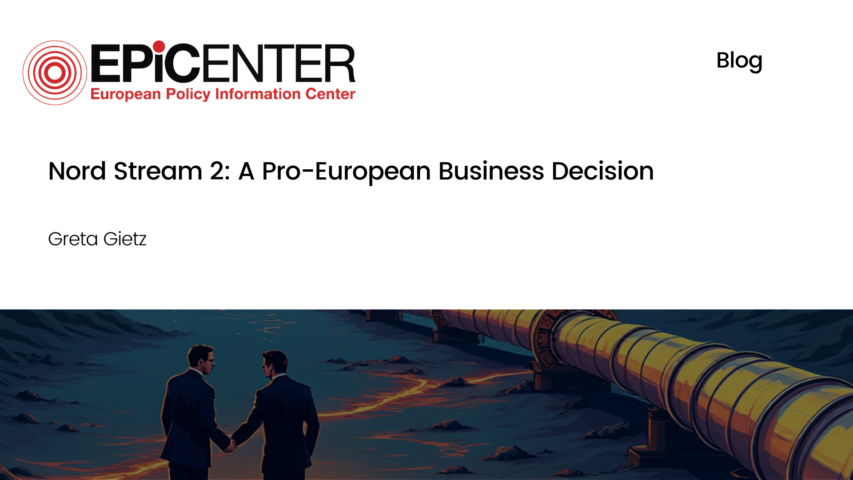Nord Stream 2: A Pro-European Business Decision

Nord Stream 2: A Pro-European Business Decision
Greta Gietz // 19.02.2016
In a time where the future of the European Idea and an ever-closer European Union are heavily debated, challenged by the Eurozone and migration crises and the possibility of a Brexit, the message sent by the implementation of the Nord Stream 2 pipeline from Russia to Germany is of highly symbolic significance. The pipeline may suggest that, despite Germany’s and particularly Chancellor Angela Merkel’s demonstrated commitment to joint European approaches and solutions to threats facing the continent, Germany’s national interest is taking clear precedence over EU policy.
As the name suggests, Nord Stream 2 is an enlargement of the Nord Stream pipeline project signed by Chancellor Gerhard Schröder and President Vladimir Putin in 2005, and inaugurated in 2011. Nord Stream was equally controversial at the time, represented as a project driven by Schröder’s personal gain and relationship with Putin, rather than to improve Germany’s energy security. The Nord Stream agreement was signed just weeks before the general election in 2005. Soon after Schröder handed off his post to Angela Merkel, he became the chairman of the shareholder’s committee of Nord Stream AG.
Critics have argued that by going through with Nord Stream 2, Germany is indicating that its energy security is of greater importance and value than a European energy union and collaborative weakening of the ever-aggressive Putin and Russia. Furthermore, Nord Stream 2 contradicts Merkel’s previously firm line on dealing with Russia. Merkel led the way in imposing strict economic sanctions on Russia after its annexation of Crimea and subsequent invasion of the eastern Ukraine in 2014. Now, her support for Nord Stream 2 – critics argue – is undermining these sanctions by strengthening gas giant Gazprom, and with that the Kremlin, and increasing Germany’s dependence on Russia.
However, looking at the Nord Stream project from an economic perspective shows that it is a sound business decision aligning with the EU’s energy policy goals, not an anti-European political move or “the seal of an anti-Polish Russo-German axis” as proposed by the Polish Prime Minister Beata Szydło. Furthermore, this pipeline and its economic benefits will outlive Vladimir Putin and his aggressions. In the long-term, Nord Stream 2 will expand trade between Russia and Europe, a demonstrated powerful tool in reducing the likelihood of confrontation and conflict. It is a mutually beneficial project that will improve the welfare of consumers and the energy market.
The Nord Stream 2 pipeline will run through the Baltic Sea, directly from Russia to Germany, thereby bypassing transit through Eastern European countries, such as the Ukraine and Poland. The Ukrainian and Polish governments are growing increasingly anxious with Germany because Nord Stream 2 means a huge loss in transit fees and reawakens their fear of a continued and growing dependence on Russian energy. However, the German Vice-Chancellor, Sigmar Gabriel (SPD), has assured the preservation of the gas transit route through the Ukraine and the Yamal pipeline through Poland. Nord Stream 2 will function to alleviate Europe’s declining gas production and the risks of supply disruptions via the land routes.
EU energy policy aims to strengthen and diversify the internal energy market and secure energy supply. The Nord Stream 2 pipeline does not contradict the union’s policy aims and will serve as an efficient and secure energy supply, impervious to geopolitical instabilities in the Ukraine. The pipeline will supply gas directly from Russia to Germany, and with that to the entire EU energy market, which is set to become more integrated in the coming years. Once it has reached the EU, it is not inhibited by country borders but open to competitive market forces. The gas transported through Nord Stream 2 will add to Europe’s energy security and increase competition to supply its energy needs.
Alongside the Baltic Liquefied Natural Gas (LNG) plant in the Gulf of Finland, Nord Stream 2 is part of a number of initiatives planning to increase energy supplies to Europe, some of which aim to make countries less dependent on Russian gas while others increase energy trade with Russia. In line with the EU’s proposed efforts to further integrate, stabilise and liberalise the European energy market, Nord Stream 2 and others aim to address the economics of Europe’s energy supply and keep the politics separate.
Aside from the obvious economic benefits, a joint venture such as Nord Stream 2 could help warm the icy relations between Russia and the West. This is not necessarily an anti-European venture, but rather an effort at normalising political relations and stimulating investment, all the while giving EU Member States more energy security over the long term.
Greta Gietz is Events & Outreach Officer at EPICENTER.
EPICENTER publications and contributions from our member think tanks are designed to promote the discussion of economic issues and the role of markets in solving economic and social problems. As with all EPICENTER publications, the views expressed here are those of the author and not EPICENTER or its member think tanks (which have no corporate view).



